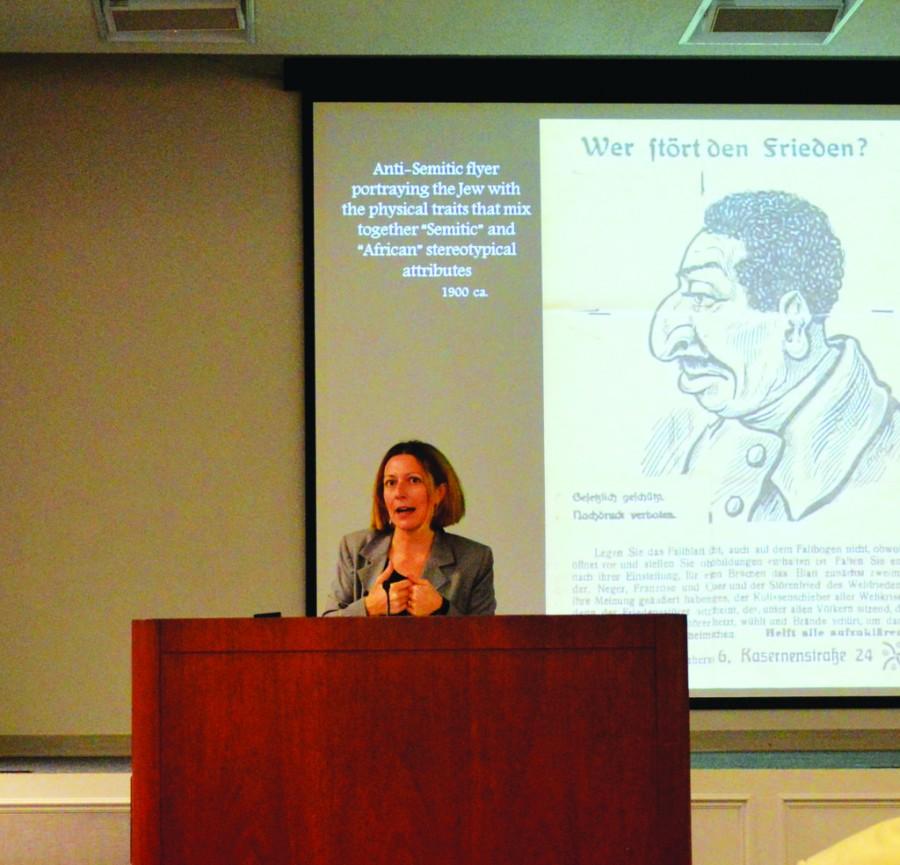On Tuesday, Jan. 27, the Office of Multicultural Affairs and the Multicultural Advisory Board hosted their annual International Holocaust Remembrance program in the Cauthen Educational Media Center’s Lowrimore Auditorium.
The program was held to honor the seventieth anniversary of the Holocaust and the end of World War II (WWII). Dr. Daphne Carter-McCants, assistant dean of students and faculty advisor for the Multicultural Advisory Board, opened the program with a welcome address.
“The purpose of this program is to educate our campus [and] community about the Holocaust genocide and [help them] learn more about the impact it made on the Jewish community,” Carter-McCants said.
In order to teach the audience about the events that took place during WWII, the Office of Multicultural Affairs and the Multicultural Advisory Board invited Dr. Frederica K. Clementi to speak during the program.
Clementi is an associate professor of Jewish studies at the University of South Carolina (USC) and the Peter and Bonnie McCausland Fellow of English Language and Literature. She is the author of the book “Holocaust Mothers and Daughters: Family, History, and Trauma” and the article “Nightbirds, Nightmares and the Mothers’ Smile: Art and Psychoanalysis in Sarah Kofman’s Life-Writing” published in the Women in French Studies journal in 2011. She has also published many other works in various journals including The European Journal of Women’s Studies and Contemporary Women Writers of the Oxford University Press.
Clementi’s presentation was titled “History doesn’t ‘just’ happen.” She began by explaining the context of WWII and how the events that occurred before the war and leading up to it such as the economic crises plaguing Europe, the fall of empires such as the Austria-Hungarian empire, the rise of Fascism and Communism, and the expansion of the Nazi party were all catalysts for what was to become the Holocaust.
Through her research and personal experience, Clementi claimed that genocide like the one that took place during WWII could only be the result of hatred and intolerance.
In addition to the basic facts of the Holocaust during WWII, Clementi explained that she believes the Jewish persecution did not begin or end with the war. She went in depth with the history of oppression the Jews faced throughout history including being forced to wear symbols identifying them as Jews and being forbidden to intermarry with Christians.
Clementi defined anti-Judaism and anti-Semitism and went in depth to help the audience members understand the difference between the two. She explained that anti-Judaism is the hatred of the religious aspect of Judaism and their belief that Jesus Christ was not the Messiah. In contrast, anti-Semitism is the persecution of Judaism as an ethnicity.
As a Jew herself, Clementi had experience with the anti-Semitic views throughout Europe before she came to Boston, Mass. in 1996. Born in Rome, Italy, and later spending time in Paris, France, Clementi was able to describe first-hand the hatred toward the Jewish population even after the end of the war. Some of Clementi’s close relatives even had personal experience with the Holocaust.
During the war, Clementi’s uncle, who was 11 years old at the time, survived a Nazi concentration camp by acting as a translator for the Nazi soldiers. He translated both Italian and German languages for the regime, which helped him to survive the camp. Once the camp was liberated, her uncle then walked from Germany to his home in Rome, Italy – over 850 miles.
Clementi used her knowledge of the Holocaust to explain to the audience members what the Jewish people went through leading up to their relocation to the concentration camps. She described the ghettos, or walled-off neighborhoods, reserved only for Jews and pograms, a Russian word meaning “storm,” that took place throughout Europe in which locals targeted Jews, destroying property, beating members of the Jewish population and, in some cases, murdering people.
According to Clementi, the Holocaust was entirely possible because of the events leading up to WWII. She explained that she believes that the hatred was already in place; all that was needed was the legalization of attacks on the Jewish people that came with the rise of the Nazi party.
At the end of her presentation, Clementi projected a quote from a Jewish proverb that says, “Who saves one life saves all of humanity.” She concluded with a moment of silence to remember those who were killed in concentration camps during the Holocaust. Clementi played a slideshow during the moment of silence with pictures from the concentration camps and other attacks on the Jewish populations in Europe including the last known video of Anne Frank.
